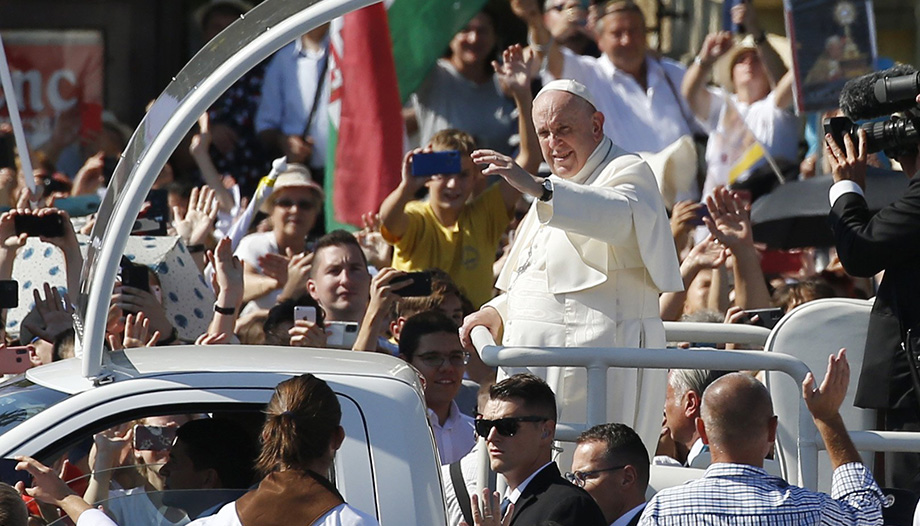In view of the apostolic journey of His Holiness Francis to Hungary (April 28-30), the ISCOM Association has promoted an online meeting attended by more than 30 Vatican journalists, largely the same ones who will travel with the Pope and follow his three-day visit to Hungary.
Csaba Török, parish administrator of the cathedral of Esztergom and responsible for Catholic broadcasts on Hungarian public television.
First, some historical notes on the presence of the Catholic Church, whose first traces date back to Roman times (4th century), with the first settlements of the Hungarian population in the Urals, a mountain range on the border between Europe and Asia.
Catholicism in Hungary
Next, Török takes for granted that the first contacts of Christianity with the Magyar people were the prerogative of the Eastern peoples of Armenian and Greek rite. "Even today there are many Catholics of Greek rite, the encounter with the Latin Church occurred with the arrival of the Hungarians in the Carpathian basin in the 10th century."
Stephen, king of Hungary, was the main architect of the conversion of the Magyars to Christianity: he undertook the evangelization of the country, which had already begun in the 9th century by the Church of Constantinople, and consolidated national unity by fighting against tribal power. In its frontier position, it opted for the West rather than the East, and for independence rather than vassalage to the Romano-Germanic or Byzantine Empire.
He founded numerous monasteries, including St. Martin of Pannonhalma, and through the monk Anastasius and the bishop of Prague obtained from Pope Sylvester II the crown with which he was crowned "Apostolic King" in the year 1000.
The East-West duality, Török explains, continues to find expression today. "Two political movements, let's say, one more Western Catholic, the other more Eastern Protestant nationalist."
After a quick review of key passages in Hungarian history (the Turkish invasion, the role of the Habsburgs, the collapse of the Kingdom in the 20th century, the advent of communism with the nationalization of church schools, the arrest of Cardinal József Mindszenty and the dissolution of religious orders), Török stressed that Hungarians who declare themselves Catholics today number around 40%, compared to 12% of Protestants.
Papal visits to Hungary
The first visits of a Pope to Hungary were those of John Paul II (August 16-20, 1991, September 6-7, 1996).
"The first was very important," says Török, "because of the then recent fall of communism and because of the significant visit to Esztergom, the ecclesiastical center of the country, beyond the meeting in the Budapest stadium with a crowd of faithful, including many young people."
On September 12, 2021, Pope Francis' very brief visit to Budapest for the Eucharistic Congress.
The Catholic Church in Hungary is now preparing to welcome Pope Francis from April 28-30. "The central word of this visit is future and our future is Christ," clarifies Father Csaba Török. "The official motto itself is 'Christ is our future.' I do not know what speeches the Pope will deliver in Budapest. The Church in Hungary strongly feels the social and cultural changes, the fading of traditional religiosity, and now we are waiting for a Message for the future. How to start over? How to find our future? How to show that Christ and faith are the way for the future of our country".
Possible presence of Patriarch Kirill?
As for the possibility of a presence in Budapest of Patriarch Kirill or his representative, Fr. Török replied that "already in 1996, when Pope John Paul II came to Pannonhalma, there was an open question", namely, whether "that visit could be an opportunity for a meeting with the then Patriarch of Moscow Alexis II".
The Church in Hungary," the priest stresses, "has always tried to serve as a bridge between Orthodoxy and the Latin Catholic Church. Even now there are open questions, given the political situation", although at the moment "there is no talk about it".
The priest recalls that at the International Eucharistic Congress of 2021 in Budapest, the Ecumenical Patriarch and representatives of the Orthodox Churches were present, but officially we know nothing about it'.
The themes of Francis' visit
Peace and dialogue, among the central themes of the visit.
In Budapest, the Pope will also hold institutional meetings with the Head of State, Prime Minister Viktor Orban, and with the authorities and representatives of civil society and the diplomatic corps.
In this regard, Father Török recalls that also in 2021, when the Pope visited Budapest on the occasion of the International Eucharistic Congress, Prime Minister Victor Orban gave the Holy Father "a very special gift", an ancient letter dating back to the Mongol invasion after which half the population was annihilated.
"Victor Orban delivered the then king's letter to the Pope, whom he asked for help to save and preserve Christianity in Hungary and throughout Europe. "It was a sign. Victor Orban presents himself as a protector of Christianity and consciously seeks a connection with the Pope."
Another topical issue is migration. "Many Catholics work in NGOs and try to help." "The Church's charitable institutions try to find the small door if you can't enter through the big one, and in this context the services of the Order of Malta and Caritas have done a lot."








